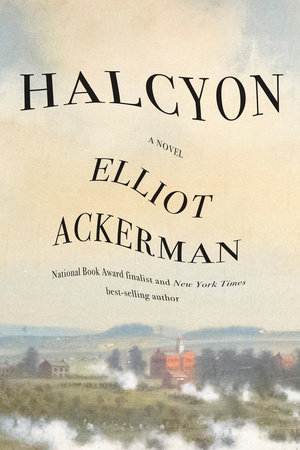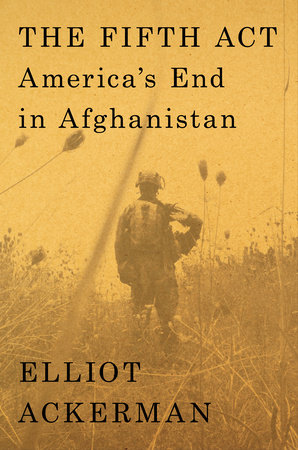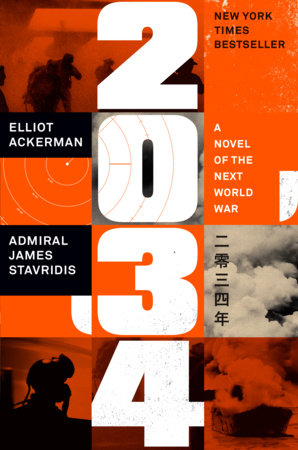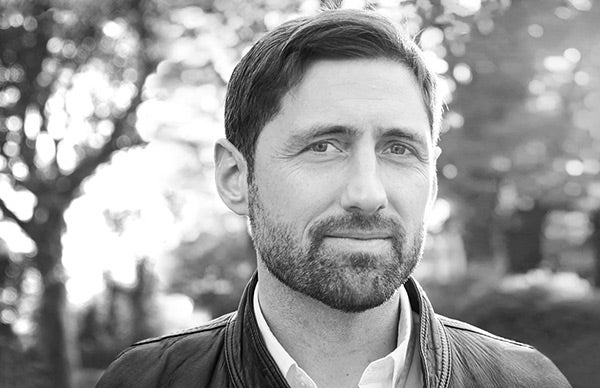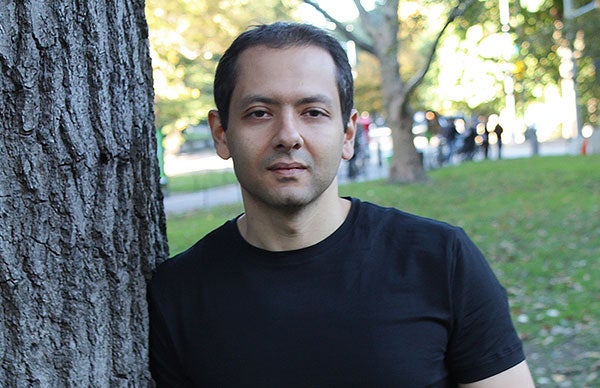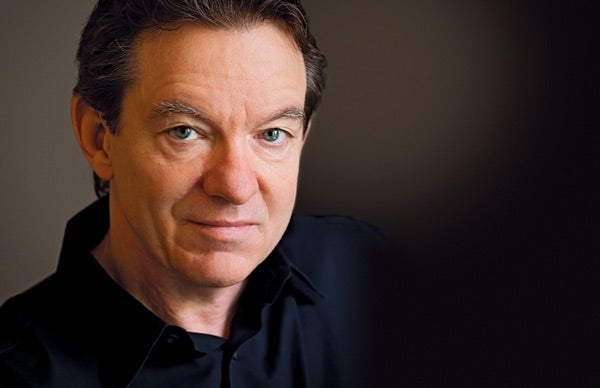Elliot Ackerman
International relations expert, bestselling novelist, journalist, and U.S. Marine Corps Veteran
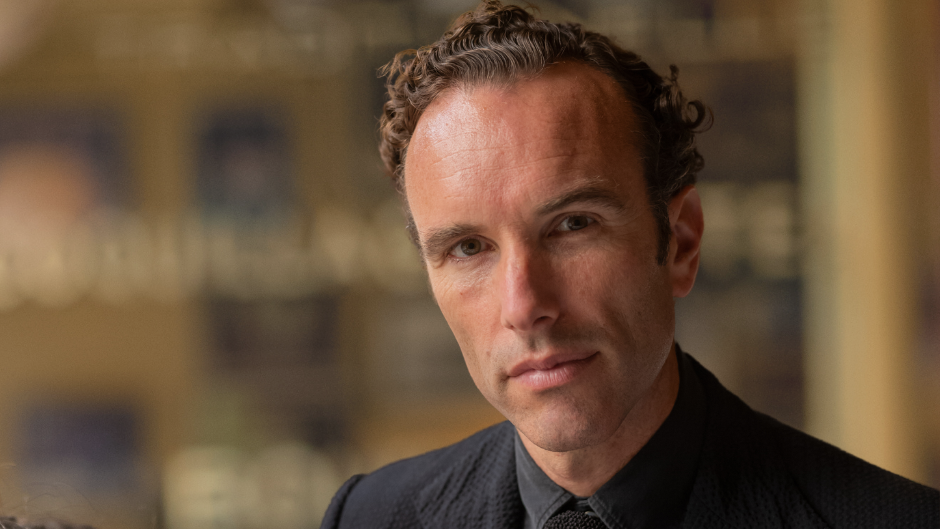
-
About Elliot Ackerman
Elliot Ackerman is a writer, journalist, former White House Fellow, and decorated veteran. His books have been nominated for the National Book Award, the Andrew Carnegie Medal in both fiction and nonfiction, and the Dayton Literary Peace Prize. A former Marine, he served five tours of duty in Iraq and Afghanistan, where he received the Silver Star, the Bronze Star for Valor, and the Purple Heart. As a prominent figure in the veteran community and a regular contributor to TIME, CNN, and The Atlantic, Ackerman uses his platform to speak about his time serving in Iraq and Afghanistan, his perspective on current international relations in the Middle East and in Ukraine/Russia, and how he turned to writing—both fiction and nonfiction—to chronicle America’s struggles abroad.
Elliot Ackerman’s 2023 novel, Halycon, is a portrait of an alternate historical reality, in which Al Gore is entering his second term as president and scientists have discovered a cure for death. Stretching from pivotal elections to intimate family secrets, from the Battle of Saipan to the toppling of Confederate monuments, Ackerman’s novel grapples with what history means, who is affected by it, and how the complexities of our shared future rest on the dual foundations of remembering and forgetting.
Ackerman is also the co-author, with Admiral James Stavridis (former commander of NATO), of the bestselling novel 2034, a chillingly authentic geopolitical thriller that imagines a future naval clash between the US and China in the South China Sea, and the path from that conflict to a nightmarish global conflagration. Exploring military capabilities from stealth technology to cyber weaponry, and spanning from Washington, DC, to Iran and the Strait of Hormuz, to the South China Sea, 2034 is a disturbingly plausible novel that illuminates one of our most dire geopolitical threats and the limits of American power. The sequel, 2054, is set twenty years further in the future, at a moment when a radical leap forward in artificial intelligence combines with America’s violent partisan divide to create an existential threat to the country, and the world.
Elliot Ackerman’s other books search deeply into the personal and political dimensions of our relationships, both in foreign settings and here at home. In his novels Red Dress in Black and White, Waiting for Eden, and Dark at the Crossing, Ackerman presents characters either directly or tangentially affected by warfare, and his memoirs, Places and Names and The Fifth Act, include vivid and powerful stories of Ackerman’s own experiences in combat and his work to evacuate Afghan allies during America’s tragic last days in Afghanistan. His novel Waiting for Eden garnered ecstatic reviews; it was an Indie Next pick, as well as a finalist for the Indies Choice Award for Adult Fiction, an Amazon Book of the Month, and an ALA Notable Book. Before that, his novel Dark at the Crossing, set along the Syrian border, was a finalist for the National Book Award.
Elliot Ackerman’s other writings have appeared in Esquire, The New Yorker, The Atlantic, and more, and have been listed under The Best American Short Stories and The Best American Travel Writing. He divides his time between New York City and Washington, D.C.
Contact us for more information about booking Elliot Ackerman for your next event.
-
Speaking Topics
The Current Global Disorder
As a journalist, Elliot Ackerman has covered the wars in Syria, Iraq, and Afghanistan, as well as Russia’s recent war in Ukraine. In his memoir The Fifth Act: America’s End in Afghanistan, he not only chronicles America’s chaotic withdrawal from Kabul, but also the implications of that withdrawal on the global order. In this lecture, he will discuss the geopolitical connections between the U.S. decision to withdrawal from Afghanistan, the Russian decision to invade Ukraine, and current Chinese militarization. He will discuss the variety of national security threats that comprise our current global disorder. He will also discuss how these threats from abroad have contributed to America’s greatest national security threat: our own dysfunction.
How to Develop a Strategic Imagination
The pandemic. The 2008 financial crisis. The 9/11 attacks. Each of these crises caught world leaders unprepared—each was a failure of imagination. Elliot Ackerman writes across genres, from literary fiction, to journalism, to works of speculation. This includes the runaway New York Times bestseller 2034: A Novel of the Next World War (co-authored with Admiral James Stavridis) and Halcyon, a novel that imagines current fault lines along gender (#MeToo) and race (America’s racial reckoning) under an Al Gore presidency. In this lecture, Elliot Ackerman offers tools on how individuals and organizations can hone their strategic imaginations.
The Case for the Draft
Our military is a reflection of our society. In a widely discussed TIME cover story, as well as in his memoir The Fifth Act: America’s End in Afghanistan, Elliot Ackerman made an argument for reinstituting the draft. In this lecture, Elliot Ackerman charts America’s shifting relationship with its military and why the current civil-military divide in this country is a disturbing bellwether of several troubling societal trends. He discusses the evolution of his own thought, from someone who served as a military professional to his belief that such professionalization is a danger to our democracy.
-
Video
-
Praise for Elliot Ackerman
We thought the lecture went really well. Feedback has been great, both at Bowdoin and beyond. I think Elliot’s words really resonated.
— Bowdoin Marine Corps SocietyPraise for 2054
2054 is a compelling, terrifying and totally plausible thriller of future world history and calamity–not so far away–crafted into a sophisticated geopolitical narrative superbly handled by this unique partnership of retired admiral/NATO supremo, and a prize-winning literary writer of beautiful novels who also happens to be a decorated Marine who served in Iraq and Afghanistan. Excellent–and a worthy sequel of their thriller 2034.
— Simon Sebag Montefiore, author of The World: A Family HistoryGripping and imaginative . . . an enjoyable techno-thriller that explores the chaotic, self-destructive potential of human ingenuity.
— BooklistPraise for Halcyon
A novel of ideas in an age of opinions.
— Kirkus ReviewsA thoughtful and fascinating thought experiment, one that explores mortality, fate, and the malleability of historical memory.
— BooklistPraise for 2034
This crisply written and well-paced book reads like an all-caps warning for a world shackled to the machines we carry in our pockets and place on our laps . . .
— The Washington PostConsider this another vaccine against disaster. Fortunately, this dose won’t cause a temporary fever—and it happens to be a rippingly good read.
— WiredThose seeking a realistic look at how a future world war might play out will be rewarded.
— Publishers WeeklyChilling yet compulsively readable work of speculative fiction . . . Ackerman and Stavridis have created a brilliantly executed geopolitical tale that is impossible to put down and that serves as a dire, all-too-plausible warning that recent events could have catastrophic consequences.
— Booklist, starred reviewWar with China is the most dangerous scenario facing us and the world. Absent a strategic method to manage our differences, Jim Stavridis and Elliot Ackerman’s chilling novel presents a realistic series of miscalculations leading to the worst consequences. A sobering, cautionary tale for our time.
— Jim Mattis, General, U.S. Marines (Ret.) and 26th Secretary of DefenseA brilliant thriller! Masterfully plotted and elegantly written, 2034 is a literary tour-de-force. Let’s just hope none of it comes true.
— Brad Thor, #1 New York Times bestselling author of Near DarkA real page-turner, 2034 is a novel about a conflict we hope never happens. Drawing on their deep operational and diplomatic backgrounds, Admiral Stavridis and Elliot Ackerman have conjured a nightmare we desperately need to avoid. The novel is a cautionary tale for our times, and a reminder how quickly events can spin out of control—even before 2034.
— Robert M. Gates, Secretary of Defense 2006-2011I could not stop reading 2034. With sharply drawn, vibrant characters caught in an all too plausible future conflict, the novel left me fascinated, moved, thrilled and, ultimately, haunted.
— Phil Klay, author of <i>Missionaries</i>2034 is an exciting, interesting, and informative novel about a hypothetical future war with China that is largely determined by actual decisions already made. It describes in detail how a single technological leap forward by an adversary, in this case China, could destroy our ability to communicate, resulting in a blind, hapless military. It also demonstrates how today’s military policies will leave a future United States without adequate resources to wage a high intensity conventional war and be forced to resort to a first strike nuclear response and its horrific consequences. Anyone who is concerned about where today’s military technology decisions are taking us should read this book.
— Karl Marlantes, author of Matterhorn and Deep RiverPraise for Red Dress in Black and White
Shrewd, intricately plotted, propulsive . . . Ackerman has been compared with Hemingway, for the clarity of his prose and his international settings. And there’s something of Graham Greene, too.
— Washington PostElliot Ackerman is known for writing novels set at the burning edges of wars. Having worked so impressively at overturning the conventions of war fiction, Ackerman has now written a novel without a single soldier in it . . . He’s decided on a different sort of drama, a territory of intrigue and tricks, entirely absorbing, with other sources of suspense . . . Ackerman’s rich knowledge of Turkey is evident on every page. The book’s stunning scenes of the protests in Gezi Park are superbly written.
— Joan Silber, New York Times Book ReviewCunning, atmospheric and filled with surprises in ways that call to mind the fiction of Joseph Conrad and John le Carré. Partly an ethical Rorschach test and partly a thriller in the vein of The Year of Living Dangerously, it’s the best novel yet from Ackerman . . . Red Dress in Black and White spins you headlong into a world of political unrest and wayward desire. It delivers its shocks and surprises in teasing measures . . . The book is vivid, chewy, incisive . . . It’s also a ton of tangled fun . . . Splendidly gnarly.
— Michael Upchurch, Seattle TimesThe whole book is taut, balanced between order and chaos, just like Istanbul in that summer of 2013 . . . A close reader is rewarded for his attention.
— Rob Merrill, Associated PressFull of political intrigue, extramarital affairs, and unfulfilled ambition.
— The MillionsAt once suspenseful and delicate, Red Dress in Black and White depicts love in a brutal time.
— Adrienne Gaffney, Elle.comThe novel amazingly unfolds in only a single day . . . A suspense-laced story of politics and cultural intrigue . . . Ackerman’s vivid descriptions of life in Istanbul, his character development, and the complex but unique plot merge to make this novel a captivating book.
— —Kate Padilla, AuthorlinkThis absolutely riveting novel moves rapidly . . . An attention-grabbing, cleverly plotted, character-driven yarn . . . In Agatha Christie fashion, Ackerman gathers his characters for what appears to be the grand finale but saves the true reveal for the very end.
— Michael Russo, Library Journal (starred)Deftly plotted.
— Kirkus ReviewsRed Dress in Black and White asks thought-provoking questions about the place of power both in love and in politics. For those who witnessed it, it is impossible to forget Gezi; same goes for this book.
— Özgür Mumcu, columnist for Cumhuriyet and best-selling author of Peace MachineAckerman’s trademark prose evocatively captures the strained nature of contemporary Turkish life . . . Deftly hints at a shadowy world that exists just out of frame and is one that lives long in the memory.
— Alexander Moran, BooklistPraise for Waiting for Eden
Patiently, and unflinchingly, Ackerman is becoming one of the great poet laureates of America’s tragic adventurism across the globe.
— Pico IyerHeart-wrenching.
— Rachel Martin, Morning Edition/NPRMasterly . . . Brilliant . . . In his short novel, Ackerman accomplishes what a mountain of maximalist books have rarely delivered over tens of thousands of pages and a few decades: He makes pure character-based literary art, dedicated only to deeply human storytelling . . . Rachel Cusk’s Outline trilogy and Jenny Offill’s Dept. of Speculation have created similarly shimmering portraits of humans at rest and fury . . . Ackerman explore[s] conflicted, confused true love in such elegant and humane ways that you will come to question everything you think you know about the meanings of romance and fidelity . . . The micro-level power of his unadorned and direct prose lies in no less than an attempt to contain and dramatize the darkness and light of our souls . . . To identify this book as a novel seems inadequate: Waiting for Eden is a sculpture chiseled from the rarest slab of life experience.”
— Anthony Swofford, New York Times Book ReviewA slim heartbreaker about a war veteran who reflects on his troubled, secretive marriage.
— Entertainment WeeklyA classic triangle story of love and friendship, a ghost story, a captivity narrative, and a study of human endurance . . . all of it easily read in one sitting . . . Ackerman’s novel quietly suggests that America itself is a ghost story, and we are all in the act of waiting for Eden.” —
— Brian Turner, Washington PostHaunting . . . Daring . . . Ackerman’s spare but vivid prose conveys everything it needs to convey.
— Michael Upchurch, Boston GlobeA novel about life-or-death decisions . . . Part of a long tradition of slim novels that take place almost entirely on Christmas, stretching back to Charles Dickens’s A Christmas Carol . . . Ultimately hopeful.”
— Erin Vanderhoof, Vanity FairAckerman further shows himself to be the Tim O’Brien of our era.
— VogueWith Waiting for Eden, Elliot Ackerman tells a story that cuts straight to the heart of the human condition. His sentences are elegant in their concision and directness, and they reveal as much about grief, love, and our duties to each other as any book I can recall reading. It’s a bold, ambitious project even in its most quiet moments, for it asks no less than where we draw the line around the inherent value of human life. This is a devastatingly sad and compassionate piece of work. Extraordinary.
— Kevin Powers, author of The Yellow Birds and A Shout in the RuinsFar more than a war story . . . A tautly written, gripping read . . . Part mystery, part thriller, part unconventional love story, Waiting for Eden explores with gravity and sensitivity the profound questions of love and fidelity, duty and honor, and how one creates a life worth living.
— Julia Tagliere, Washington Independent Review of BooksWith sparse prose and a deft pen, Ackerman writes a profound meditation on the liminal space between our past, present, and future.
— Library Journal (starred)Gorgeously constructed . . . Unique . . . A deeply moving portrayal of how grief can begin even while our loved ones still cling to life . . . A wonderful novel.
— Booklist (starred)Heartbreaking . . . A deeply touching exploration of resentment, longing, and loss.
— Publishers Weekly (starred)Eden is a masterful work, haunting and enduring . . . Tugs at the heartstrings . . . Engrossing . . . Ackerman displays his writing craft magnificently . . . A suspenseful tale that reveals the deepest recesses of human lives, hopes, and dashed dreams.
— Jim Ewing, Mississippi Clarion LedgerAn affecting, spare, and unusual novel. ”
— Kirkus Reviews (starred)Packed with love, pain, and guilt, but above all, a meditation on the legacies we leave behind.
— BookpagePraise for Places and Names: On War, Revolution, and Returning
In Places and Names, perhaps the most striking war memoir of the year, Ackerman attempts to make sense of the reasons he served (personal and geopolitical), the people he met, the kinship he felt and the reckonings he has since confronted. Places and Names is as clean and spare in its prose as it is sharp and unsparing in timely observation.
— TIME magazine[A] spare, beautiful memoir. . . Places and Names is a classic meditation on war, how it compels and resists our efforts to order it with meaning. In simple, evocative sentences, with sparing but effective glances at poetry and art, [Ackerman] weaves memories of his deployments with his observations in and near Syria. He pulls off a literary account of war that is accessible to those who wonder ‘what it’s like’ while ringing true to those who—each in his or her own way—already know.
— The New York TimesBeautiful writing about combat and humanity and what it means to ‘win’ a war.
— Mary Louise Kelly, NPRLyrical . . . Places and Names ends with a searing and beautiful chapter that details [Ackerman’s] thoughts amid the blood, sweat and adrenaline of the Battle of Fallujah. . . . A thoughtful perspective on America’s role overseas.
— Washington PostWhat a great, honest book – the kind that makes one feel lucky to have in one’s hands. Ackerman has served his country twice: first as an infantryman in our nations wars, and then as a guide—wise beyond his years—who helps us understand what we’ve done. His prose is easy and comfortable like an old jacket. His understanding of war is so profound that one feels like secrets have been revealed—truths—information that one day may be necessary for our survival. Well done.
— Sebastian Junger, author of TribePlaces and Names is its own profile in courage: the story of how a Marine turned reporter struggled with the polemics of desolation in the Middle East. Elliot Ackerman is a man of both action and thought, and his book is closely observed, rigorously lived, and clarifying for all of us who have not understood how U.S. policy in the Islamic world went so terribly wrong.
— Andrew Solomon, author of Far and Away, Far From the Tree, and The Noonday Demon[Ackerman’s] descriptions of Syria, which he visited as a writer, were so painfully evocative for me that I had to stop reading for a time. His vivid, sparse prose bears comparison to that of Tim O’Brien in The Things They Carried or Norman Lewis in Naples ’44; Places and Names has the same clear-eyed view of what war is.
— The Spectator‘s Books of the Year 2019It’s so readable I devoured the book in one plane journey . . . a master of dagger-sharp prose and memorable detail.
— Times (UK)Brings a fiction writer’s touch to his reportage . . . His descriptions of battle itself are all the more effective for their matter-of-factness . . . A gifted and thoughtful witness.
— Sunday Telegraph[Places and Names] contains many insights into the purpose of war and how it damages all parties involved. . . . Any fan of Ackerman’s previous novels, memoirs on the Iraq or Afghanistan wars, and valuable outlooks on the nature of war and its combatants will find this phenomenal.
— Library Journal, starred reviewThe power of this memoir comes from [Ackerman’s] illumination of paradoxes and contradictions that provide a common emotional denominator for soldiers who previously found themselves in wars where they discovered more than two sides. . . . A profoundly human narrative that transcends nationality and ideology.
— Kirkus, starred review[A] searing, contemplative, and unforgettable memoir-in-essays. . . . Deeply personal yet never losing sight of the big, historical reasons for recent events, this collection recalls Michael Herr’s classic Dispatches as well as William T. Vollmann’s voluminous ruminations on violence in Rising Up and Rising Down, and is perhaps the finest writing about the Afghanistan and Iraq conflicts that has been published to date.
— Booklist, starred reviewElliot Ackerman fought the Long War, and now, with Places and Names, he gives us a searingly honest record of his ongoing effort to make sense of that war. This is, literally, a book of wanderings; Ackerman’s sojourns to conflict zones, old battlefields, and muddy refugee camps recall the wanderings of that earlier soldier, Odysseus, as he struggles to come home from war, and, no less than his predecessor, Ackerman finds himself journeying through the shadow world of ghosts and spirits that go by the name of memory. Vivid, profound, restless, and relentlessly probing, Places and Names is destined to become a classic of the Long War.
— Ben Fountain, author of Billy Lynn’s Long Halftime WalkPlaces and Names is a brilliant and gripping account of the aftermath of failed wars and revolutions, and of the still burning idealism that smolders in the wreckage. Elliot Ackerman brings a novelist’s skill with language, a reporter’s eye for detail, and his life experience as a highly decorated Marine veteran of five deployments to bear in this unique and powerful meditation on violence, heroism, and the fracturing of the Middle East.
— Phil Klay, author of Redeployment, winner of the National Book AwardElliot Ackerman’s voice scares me. It’s a bit too close for comfort. He sees too much and he knows too much, and that makes him a great guide to today’s post-everything Middle East. Read him at your own risk—but ignore this book at your own peril.
— Thomas E. Ricks, author of Making the Corps, Fiasco, and Churchill and OrwellIn Places and Names, Elliot Ackerman, a soldier turned writer, seeks out his former foes and confronts his own memories on battlefields where the killing continues. The result is one of the most profound books I have ever read about the real nature of war and the abstract allure of the ideas and the bloodshed that fuels it.
— Jon Lee Anderson, author of The Fall of Baghdad and Guerrillas: Journeys in the Insurgent WorldElliot Ackerman writes beautifully about war—especially the new wars of the Middle East through fiction and now non-fiction. His exceptional memoir is really a double memoir of his own experiences as a Marine and those of a jihadist fighter he befriends in a refugee camp. The result is an superb, unique, and unforgettable story of war and death, fear and cruelty, above all the horrors and allure of combat.
— Simon Sebag Montefiore, author of The RomanovsPlaces and Names is an extraordinarily beautiful and insightful work of memoir and journalism by a writer who deserves to be read widely. Elliot Ackerman is as adept at describing the strange cocktail of emotions that accompany the moments preceding combat as he is unraveling the Gordian Knot of contemporary geopolitics.
— Kevin PowersAckerman’s honest searching to come to terms with his war experience helped me better understand my own. This book is a gift that should be shared with every American who helped pay for people like Ackerman to fight their wars for them.
— Karl Marlantes, prize-winning author of Matterhorn and Deep RiverPraise for Dark at the Crossing
One could argue that the most vital literary terrain in America’s overseas wars is now occupied not by journalists but by novelists…Elliot Ackerman is certainly one of those novelists…He has created people who are not the equivalents of the locally exotic subjects in your average NPR story, and he has used them to populate a fascinating and topical novel.
— Lawrence Osborne, New York Times Book ReviewAckerman, who lives in Istanbul and has written some fine reportage from the Turkish borderlands, knows Gaziantep well and sharply depicts its incongruities . . . He shows boldness and empathy in trying to envision modern conflagrations from foreign vantage points.
— Sam Sacks, Wall Street JournalAckerman’s eye for detail grounds this novel in a space that quickly transports readers into a world few Americans know . . . Dark at the Crossing is not only a fictional meditation on remorse, betrayal, love and loss, but also a journey that returns us to the beautiful and broken world we live in.
— Washington PostDark at the Crossing promises to be one of the most essential books of 2017.
— EsquireVisceral, unsentimental and in a style that begs to be underlined and savored, this is a novel about how people carry the emotional and physical scars of war through their lives, and how war both demolishes and becomes home . . . The many references to actual street and district names, smells and unique predicaments, such as underfunded, understaffed hospitals that are teeming with refugees, heighten the book’s authenticity and earnestness.
— Pittsburgh Post-GazetteDark at the Crossing is every bit as taut and harrowing as the place it depicts, a region where fifteen years of relentless war play out in filthy refugee camps and upscale shopping malls. Elliot Ackerman has written a brilliant, admirably merciless novel of broken lives, broken places, and good intentions gone awry.
— Ben Fountain, author of Billy Lynn’s Long Halftime WalkInfused with profound knowledge, empathy, and chutzpah, Ackerman’s writing is hauntingly evocative and beautiful. It is a rare writer who is not afraid to deal with the toughest conflicts, ask the hardest questions, show the darkest side of even heroes, and still manage to renew our faith in humanity.
— Elif Shafak, author of The Bastard of IstanbulHere is a thriller, psychological fiction, political intrigue, and even a love story all wrapped into a stunningly realistic and sometimes horrifying package. Put Ackerman on the A-list.
— Library Journal (starred)Elliot Ackerman’s quietly subversive sensibilities make him one of the most potent and original writers to emerge from that elite platoon of men and women who, since 9/11, have laid down their guns to pick up a pen. Once again, here in his second novel, Dark at the Crossing, Ackerman insists American readers immerse themselves in the humanity of their country’s enemies and victims. His work is a unique and bittersweet blessing of raw grace and naked, bleeding empathy.
— Bob Shacochis, author of The Woman Who Lost Her SoulOnce again, Elliot Ackerman dares to imagine his way into the minds, lives, and fates of people too many American writers would judge as inaccessible—perhaps even forbidden. The result is a book whose emotional acuity is matched only by its literary artistry. They don’t award medals of valor to novelists, but while reading this book I often thought, Maybe they should.
— Tom Bissell, author of Apostle: Travels Among the Tombs of the TwelvePraise for Green on Blue
Harrowing, brutal, and utterly absorbing. With spare prose, Ackerman has spun a morally complex tale of revenge, loyalty, and brotherly love. The saga of young Aziz is a chilling and often disturbing glimpse into one of the world’s most troubled regions.
— Khaled Hosseini, author of The Kite RunnerElliot Ackerman has done something brave as a writer and even braver as a soldier: He has touched, for real, the culture and soul of his enemy.
— The New York Times Book ReviewCompassionate, provocative, and alive.
— Vogue.com -
Books by Elliot Ackerman
-
Media About Elliot Ackerman
Request Fees
and Availability
- 212 572-2013
- Elliot Ackerman travels from New York, NY
Featured Title
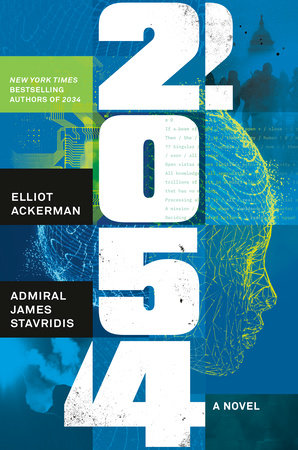
2054
"Stavridis is not just a novelist, but also Admiral James Stavridis, formerly supreme allied commander at NATO. He and Ackerman are the authors of the bestseller 2034. In this follow-up, it is 20 years after the nuclear war between the US and China when the US president collapses and dies during an address to the nation. Conspiracy theories spread, and civil war ensues. Meanwhile, computer scientists and intelligence experts believe they know what lies behind the assassination: a profound breakthrough in AI. This sounds thrilling and provocative, and one to devote a good chunk of time to reading." - New Scientist








